Plant Ecology Laboratory
Research in our lab focuses on diversity patterns in biological communities, and on the interactions underlying these patterns. The main questions we address are: how do communities vary along natural gradients and gradients of human impact? What are the major assembly rules shaping communities; and are they attributable to biotic interactions or environmental heterogeneity? What are the roles of different biotic interactions - including competition, facilitation, herbivory and symbiosis - in structuring communities? Read more
News
Meeting of SoilMan consortia
November 2019
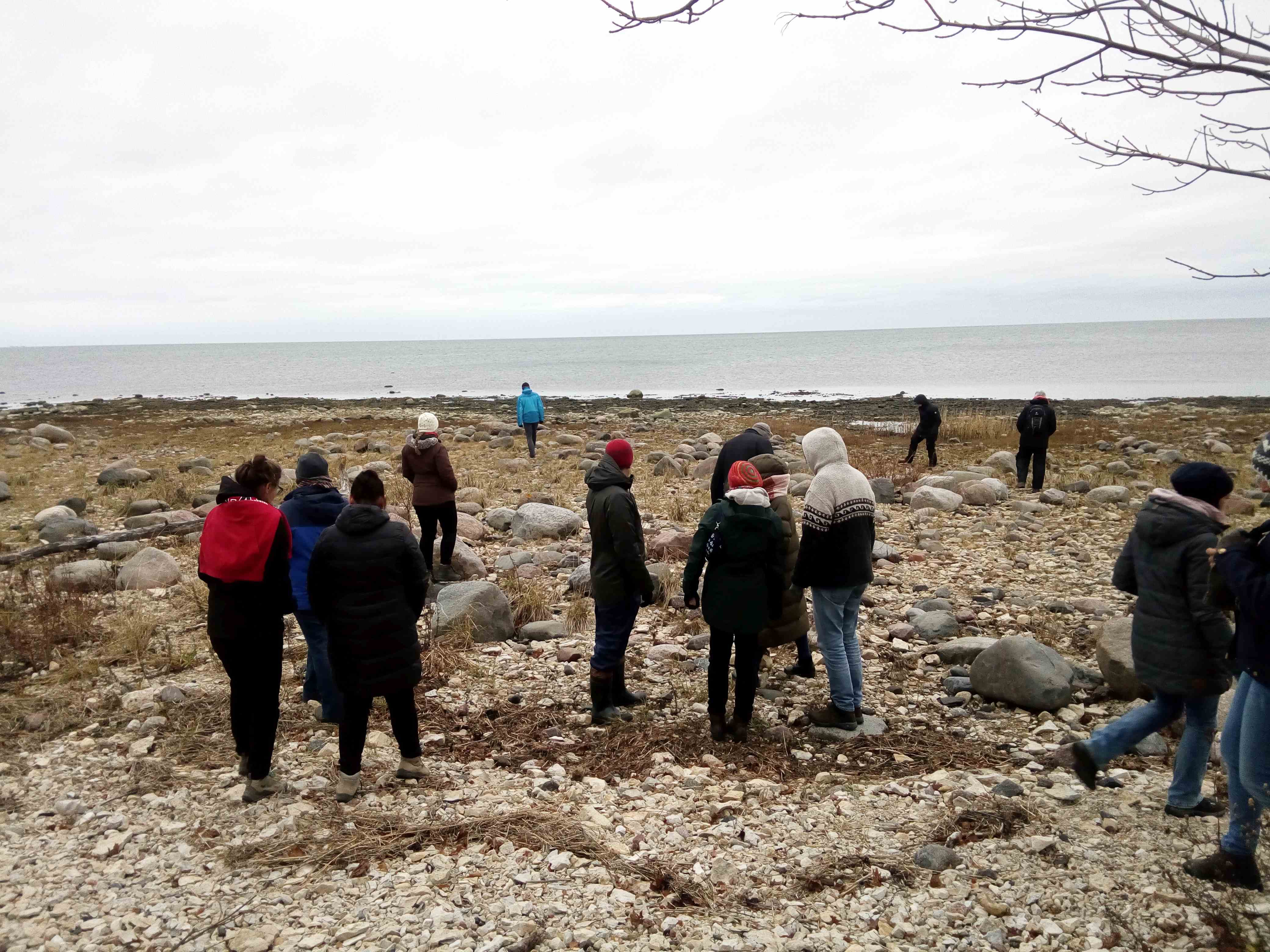 The Biodiversa3 project SoilMan meeting was held in Laelatu field station in western Estonia on 4-5th of November with the participation of 16 researchers from five countries. The discussions targeted research results on effects of farming practices, including minimized tillage and crop rotation on soil biota and crop yield, as well as what the farmers think about the topic of farm management for healthier soils. Senior researcher Maarja Öpik and Plant ecology team members Siim-Kaarel Sepp, Tanel Vahter, Siqiao Liu and Surya Sudheer organised the meeting. Siim-Kaarel presented fresh results about AM fungi in farm fields under different management regimes. Tanel introduced the ongoing survey of soil fungi in Estonian agricultural soils. After the meeting we visited Laelatu wooded meadow, Puhtu nature reserve and coastal grasslands of Matsalu National Park to learn more about the Estonian landscapes, land use and biodiversity, not to forget a glimpse into Estonian sauna and culinary culture. We thank all participants for making the event both efficient and enjoyable!
The Biodiversa3 project SoilMan meeting was held in Laelatu field station in western Estonia on 4-5th of November with the participation of 16 researchers from five countries. The discussions targeted research results on effects of farming practices, including minimized tillage and crop rotation on soil biota and crop yield, as well as what the farmers think about the topic of farm management for healthier soils. Senior researcher Maarja Öpik and Plant ecology team members Siim-Kaarel Sepp, Tanel Vahter, Siqiao Liu and Surya Sudheer organised the meeting. Siim-Kaarel presented fresh results about AM fungi in farm fields under different management regimes. Tanel introduced the ongoing survey of soil fungi in Estonian agricultural soils. After the meeting we visited Laelatu wooded meadow, Puhtu nature reserve and coastal grasslands of Matsalu National Park to learn more about the Estonian landscapes, land use and biodiversity, not to forget a glimpse into Estonian sauna and culinary culture. We thank all participants for making the event both efficient and enjoyable!
Visiting post-doc Adam
September 2019
 During September and October Dr Adam Frew is visiting the group for 5 weeks. Adam is a Scotsman by birth but now naturalised in Australia. He is about to complete his Postdoctoral Research Fellowship at Charles Sturt University in Australia and will be taking up a new appointment at the University of Southern Queensland in October to start his own teaching and research group.
During September and October Dr Adam Frew is visiting the group for 5 weeks. Adam is a Scotsman by birth but now naturalised in Australia. He is about to complete his Postdoctoral Research Fellowship at Charles Sturt University in Australia and will be taking up a new appointment at the University of Southern Queensland in October to start his own teaching and research group.
Adam is collaborating with Maarja Öpik and the group on a recent a pot experiment looking at how elevated atmospheric CO2 impacts AM fungi in Australian C3 and C4 grasses, and the effects on plant-herbivore interactions. During his visit Adam extracted AM fungal DNA from root samples and learnt as much as he could about the bioinformatics and statistical approaches used when assessing AM fungal diversity.
Adam also had the honour of giving the first seminar of the academic year to the department!
ICOM (International Conference on Mycorrhiza) 10 in Mexico
July 2019
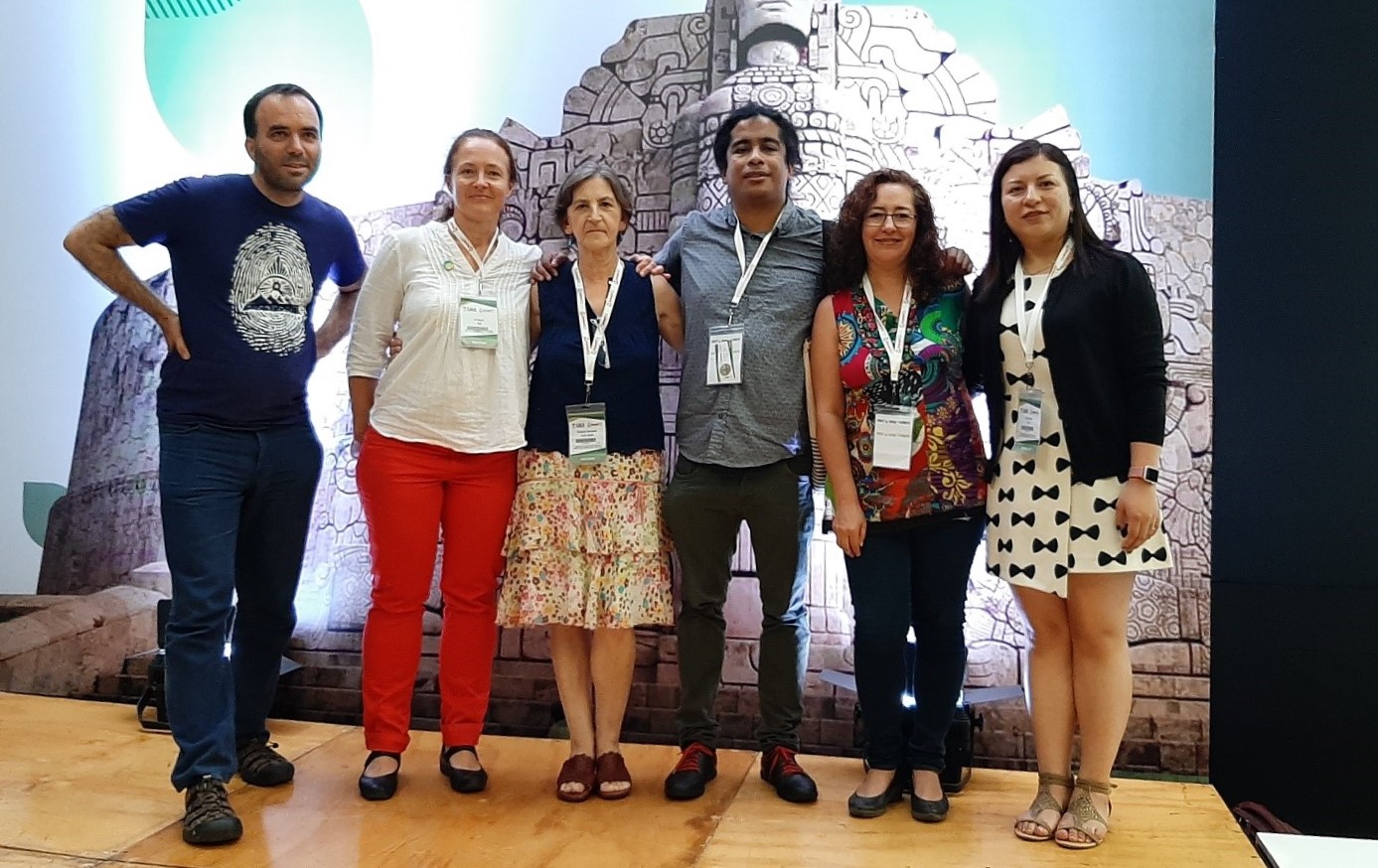 The international conference on mycorrhiza (ICOM 10) was developed in Merida, Mexico from 30th of June till 5th of July. The meeting hosted almost 300 participants from 40 different countries. Our group was represented by Maarja Öpik, who presented a talk on arbuscular mycorrhizal fungi and species pool, Daniela Leon in her first participation on a conference as a PhD student, talked about community mycorrhization along a productivity gradient and Guillermo Bueno presented two talks on biogeography of plant mycorrhizal traits. In addition, he prepared a debate along with Maarja, Daniela and other international colleagues on identification of mycorrhizal plants. Overall, the conference presented several challenges around the topic of sustainability, where mycorrhizal symbiosis could be a key factor for the future of forestry, agriculture and nature conservation.
The international conference on mycorrhiza (ICOM 10) was developed in Merida, Mexico from 30th of June till 5th of July. The meeting hosted almost 300 participants from 40 different countries. Our group was represented by Maarja Öpik, who presented a talk on arbuscular mycorrhizal fungi and species pool, Daniela Leon in her first participation on a conference as a PhD student, talked about community mycorrhization along a productivity gradient and Guillermo Bueno presented two talks on biogeography of plant mycorrhizal traits. In addition, he prepared a debate along with Maarja, Daniela and other international colleagues on identification of mycorrhizal plants. Overall, the conference presented several challenges around the topic of sustainability, where mycorrhizal symbiosis could be a key factor for the future of forestry, agriculture and nature conservation.
Editor profile of Maarja in New Phytologist
June 2019
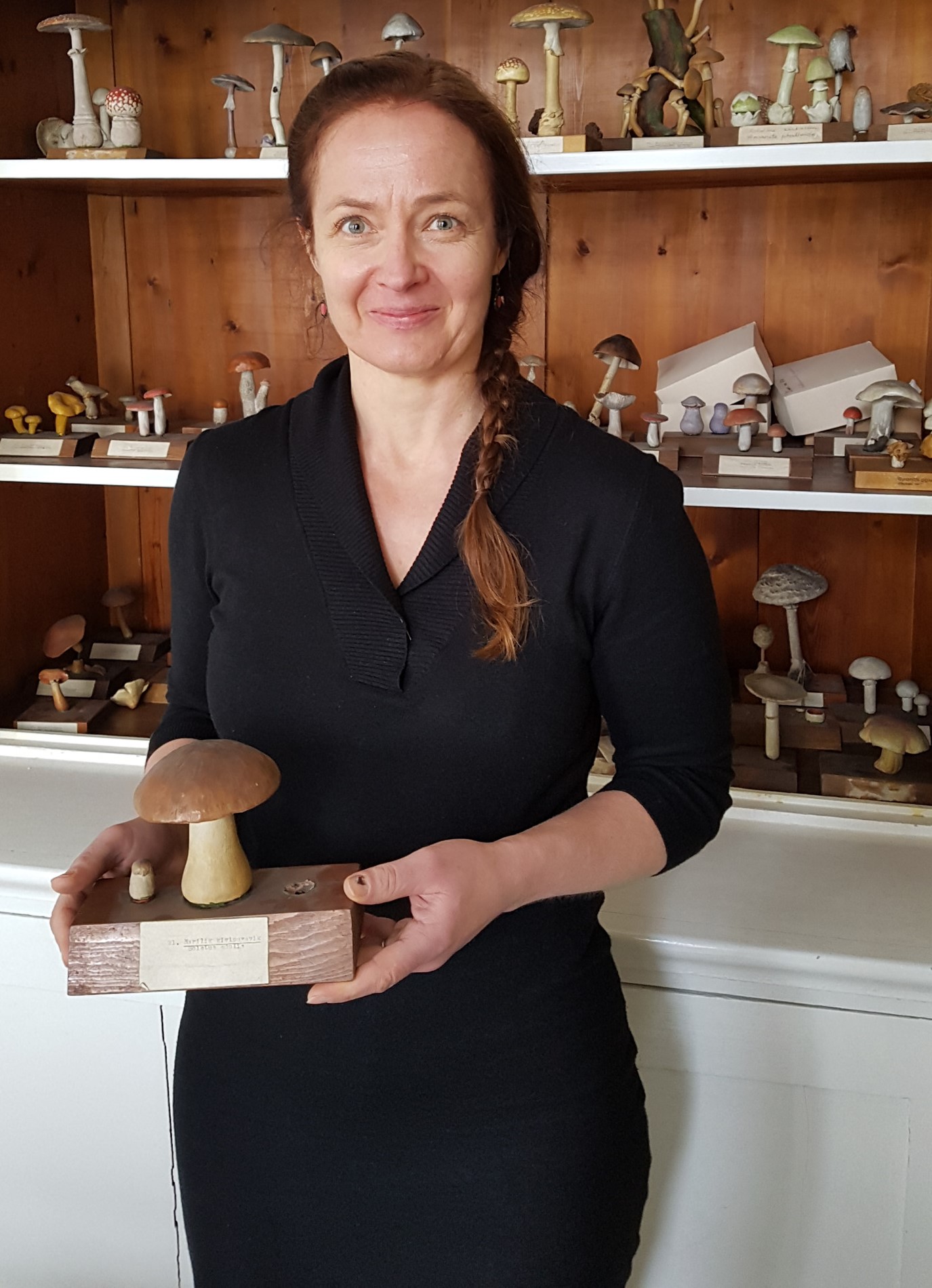 In June, science journal New Phytologist published an editor profile of senior scientist Maarja Öpik. In the article, Maarja describes how she made her way into science and what is motivating her in her research. Additionally, you can find out what is the favourite plant species of Maarja and what were the most memorable papers to read from recent years.
In June, science journal New Phytologist published an editor profile of senior scientist Maarja Öpik. In the article, Maarja describes how she made her way into science and what is motivating her in her research. Additionally, you can find out what is the favourite plant species of Maarja and what were the most memorable papers to read from recent years.
Visiting PhD student from SLU, Kaisa Torppa
April 2019
In April, our working group received a Finnish visitor from Sweden, PhD student Kaisa Torppa. Kaisa spent two weeks with us to learn the basics of root staining and microscopy for determination of root colonisation rates. Kaisa is working in SLU (Sveriges Lantbruksuniversitet, Swedish University of Agricultural Sciences) on soil biota of agricultural soils. Mostly she is concentrating on earthworms and nematodes but now also getting to know the world of AM fungi. During her stay, she also presented a small seminar and shared her experiences with soil biota in agriculture. We thank Kaisa for the exiting discussions and welcome her back in the future!
Mycorrhizal symbiosis symposium in South America
March 2019
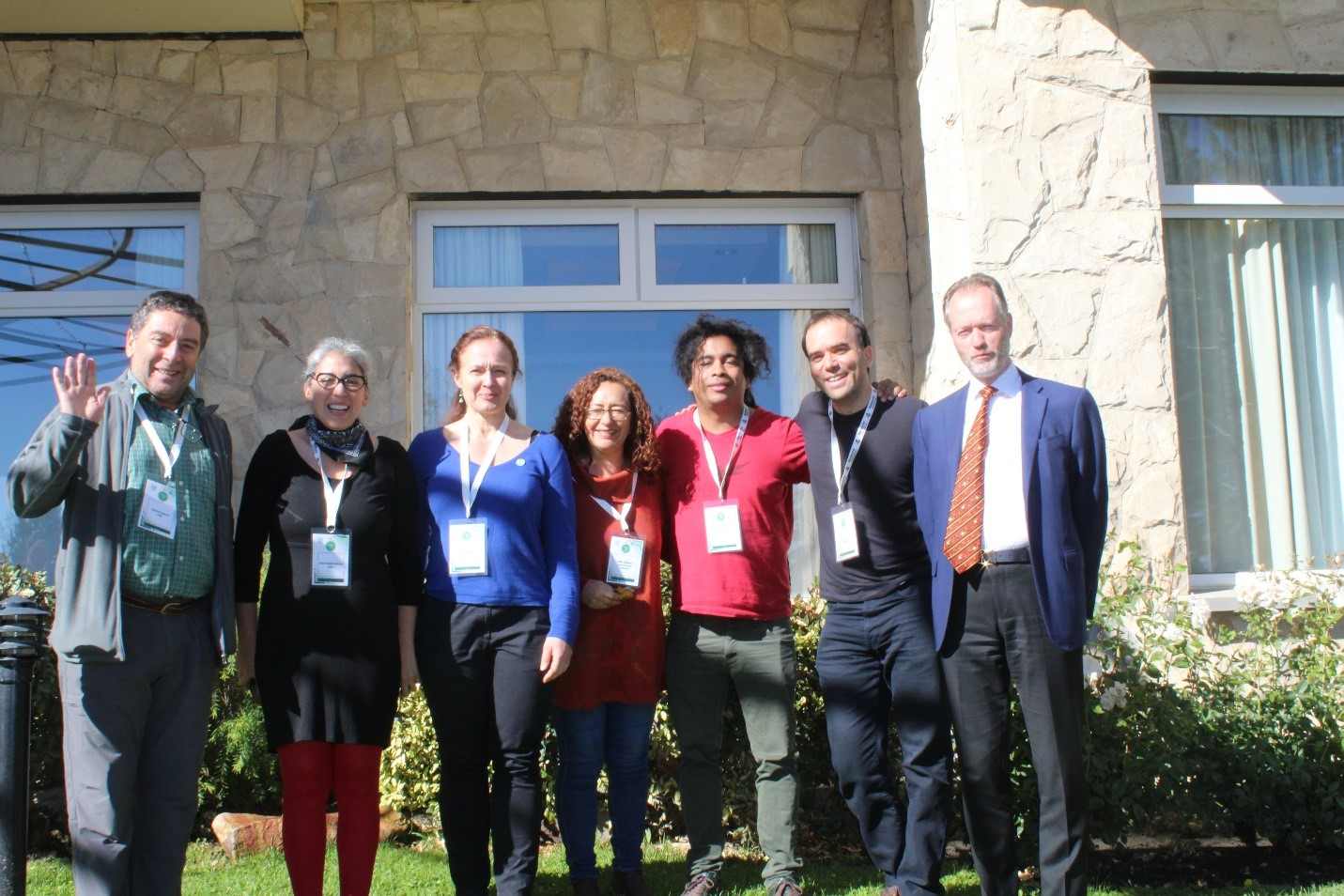 Two members of our team were invited as conference (Maarja Öpik) and invited (Guillermo Bueno) speakers to the 2nd II International Symposium: Mycorrhizal Symbiosis in South America, in Bariloche, Argentina, 6th - 8th of March, 2019. Maarja talked about AMF and environmental changes: „Arbuscular Mycorrhizal Fungi: Under the pressure of environmental change “and Guillermo about the different ways to estimate plant mycorrhizal traits: „Different estimations of plant mycorrhizal traits: limitations, suggestions and challenges “. The link with South American mycorrhizal research is strong, as the photo with our group collaborators reflects!
Two members of our team were invited as conference (Maarja Öpik) and invited (Guillermo Bueno) speakers to the 2nd II International Symposium: Mycorrhizal Symbiosis in South America, in Bariloche, Argentina, 6th - 8th of March, 2019. Maarja talked about AMF and environmental changes: „Arbuscular Mycorrhizal Fungi: Under the pressure of environmental change “and Guillermo about the different ways to estimate plant mycorrhizal traits: „Different estimations of plant mycorrhizal traits: limitations, suggestions and challenges “. The link with South American mycorrhizal research is strong, as the photo with our group collaborators reflects!
Visiting PhD Student Andrey Zuev from Moscow
February 2019
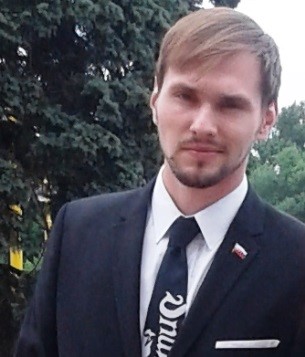 Andrey Zuev, PhD student in A.N. Severtsov Institute of Ecology and Evolution (IPEE RAS) in Moscow, Russia, supervised by Prof. Alexei Tiunov, visited our lab from January 20th to February 21st of 2019 under the framework of Short Term Scientific Missions (STSM) of COST Action ES1406 (KEYSOM), under the guidance of Dr. Maarja Öpik. His work was devoted to gaining experience with techniques of DNA extraction from nature-grown ectomycorrhizal mycelium and guts of soil invertebrate animals, as well as to learning and gaining experience with bioinformatics.
Andrey Zuev, PhD student in A.N. Severtsov Institute of Ecology and Evolution (IPEE RAS) in Moscow, Russia, supervised by Prof. Alexei Tiunov, visited our lab from January 20th to February 21st of 2019 under the framework of Short Term Scientific Missions (STSM) of COST Action ES1406 (KEYSOM), under the guidance of Dr. Maarja Öpik. His work was devoted to gaining experience with techniques of DNA extraction from nature-grown ectomycorrhizal mycelium and guts of soil invertebrate animals, as well as to learning and gaining experience with bioinformatics.
Andrey is a member of the Laboratory of Soil Zoology team in IPEE RAS. The team is working on the problems of studying the functional role of soil invertebrates, the structure of the soil communities and soil foodwebs. Within the framework of complex projects, Andrey's work is aimed at studying the fungal channel of soil food networks, as well as the biodiversity of the soil macromycetes communities.
Andrey thanks Dr. Maarja Öpik for the solicitous and mindful supervising during the visit and the whole team of Plant Ecology Laboratory, University of Tartu for detailed guidance and warm welcome.
COST Action “KEYSOM” – 3rd Training School in Tartu
January 2019
Framed within the objectives of the COST ACTION KEYSOM (Soil fauna - Key to Soil Organic Matter Dynamics and Modelling – see http://keysom.eu/) the third KEYSOM Training School was aimed at linking the role of the soil biodiversity with the soil organic matter dynamics. During three days, a comprehensive overview of the tools available to assess the soil biodiversity (including macrofauna, mesofauna, microfauna and microorganisms), such as classical taxonomic approaches and novel soil DNA metabarcoding was given to almost 50 participants.
The course was organized by Maarja Öpik and Alar Astover (Estonian University of Life Sciences) with the help of many others. A selection of speakers from our working group (Maarja, Inga, Kadri, Lena, Guille), from the University of Life Sciences (Alar Astover, Kaarel Sammet, Mari Ivask and Merrit Shanskyi) and invited guests gave fascinating insights into the interconnected world of soil organic matter and soil organisms. There were also practical lessons into determination of earthworm species, statistics and even soil mites! We are happy that the training school turned out a great success and hope that every participant managed to take home something memorable from the time in cold cold Tartu!
Visit from National Natural History Museum, Paris, France
January 2019
Our team was visited by colleagues from National Natural History Museum (Museum National d’Histoire Naturelle) and Ecole Normale Superieure, Paris, France: Marc-Andre Selosse, Florent Martos and Benoit Perez-Lamarque. Marc-Andre and Benoit provided a double seminar, presenting recent research results on co-dispersal of plants and their mycorrhizal fungal symbionts (Marc-Andre) and on patterns of interactions among plants and their arbuscular mycorrhizal fungal partners at the global scale (Benoit). In addition to vibrant scientific discussions, Estonian food, culture and nature got well sampled. Thank you for visiting!
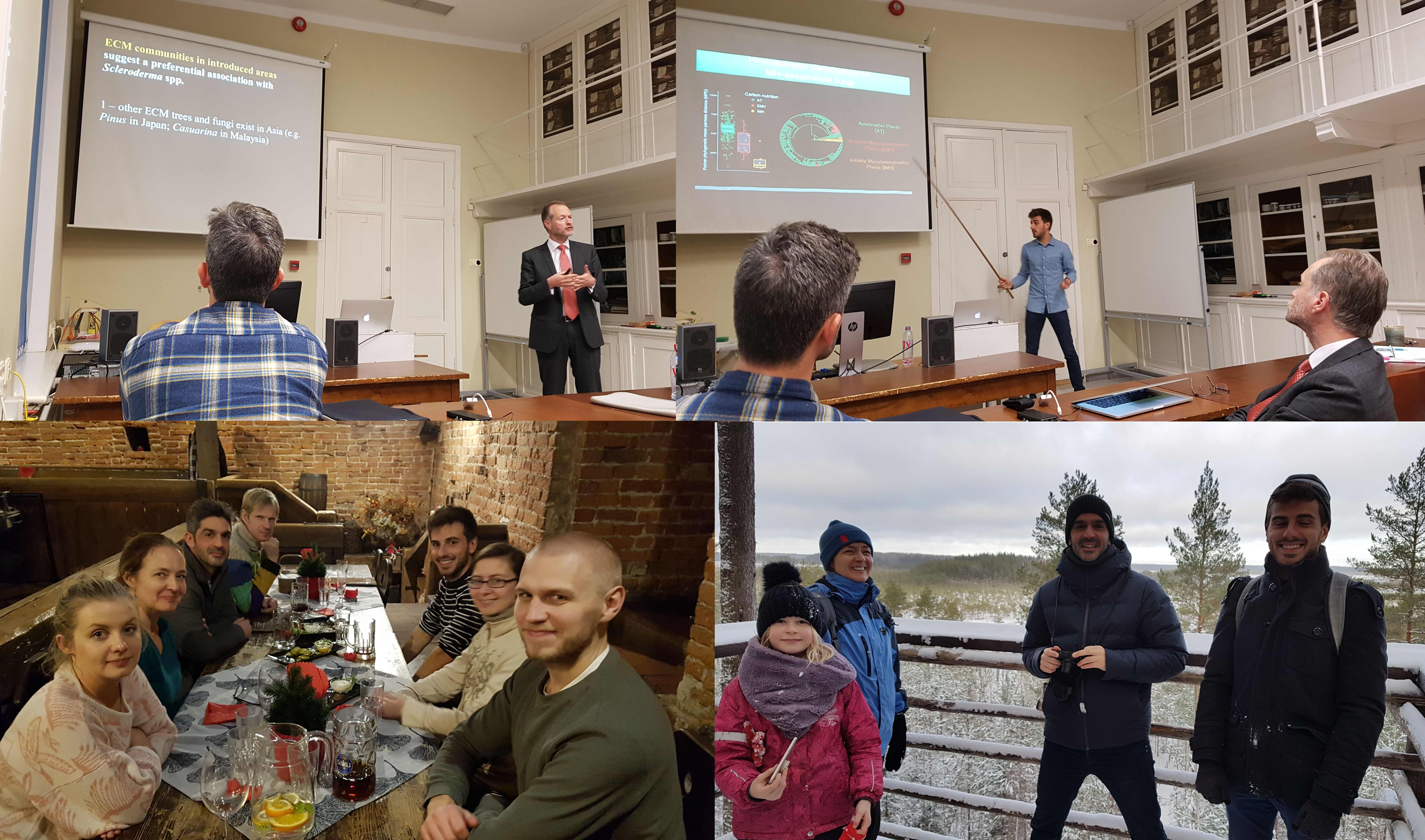
2022: march, august
2021: february, may, august, september, october
2020: february, august, september, december
2019: january, february, march, april, june, july, september, november
2018: january, february, march, april, may, june, july, october, november, december
2017: january, february, march, april, may, june, july, august, september, october, november, december
2016: january, february, march, april, may, july, august, october, november, december
2015: january, february, march, april, may, july, august, september, october, november
2014: january, february, may, july, august, september, november, december
2013: january, february, april, may, june, august, september, october, november, december
2012: january, february, march, april, may, june, august, september, october, november, december
2011: may, june, september, october, november

